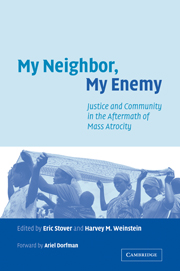Book contents
- Frontmatter
- Contents
- List of contributors
- Foreword by Ariel Dorfman
- Acknowledgments
- Introduction: conflict, justice and reclamation
- Part I Institutional approaches to justice
- Part II Social reconstruction and justice
- 7 Neighbors again? Intercommunity relations after ethnic cleansing
- 8 Memory, identity, and community in Rwanda
- 9 Attitudes toward justice and social reconstruction in Bosnia and Herzegovina and Croatia
- 10 Connecting justice to human experience: attitudes toward accountability and reconciliation in Rwanda
- 11 Public education and social reconstruction in Bosnia and Herzegovina and Croatia
- 12 Confronting the past in Rwandan schools
- Part III Survivors and justice
- Conclusion: a common objective, a universe of alternatives
- Index
8 - Memory, identity, and community in Rwanda
Published online by Cambridge University Press: 05 May 2010
- Frontmatter
- Contents
- List of contributors
- Foreword by Ariel Dorfman
- Acknowledgments
- Introduction: conflict, justice and reclamation
- Part I Institutional approaches to justice
- Part II Social reconstruction and justice
- 7 Neighbors again? Intercommunity relations after ethnic cleansing
- 8 Memory, identity, and community in Rwanda
- 9 Attitudes toward justice and social reconstruction in Bosnia and Herzegovina and Croatia
- 10 Connecting justice to human experience: attitudes toward accountability and reconciliation in Rwanda
- 11 Public education and social reconstruction in Bosnia and Herzegovina and Croatia
- 12 Confronting the past in Rwandan schools
- Part III Survivors and justice
- Conclusion: a common objective, a universe of alternatives
- Index
Summary
Commemoration is necessary, and the work of memory is indispensable.
Hutu Man, Butare, Rwanda September 8, 2001Ahabaye inkovu hadasubirana.
A wound does not heal completely.
Rwandan proverbSince taking power in July 1994, the Rwandan government has undertaken an ambitious social engineering program intended to prevent future ethnic violence in the country. Believing that the 1994 genocide grew out of problems rooted deeply in Rwandan culture, the government has implemented a series of policies to foster a unified national identity, encourage respect for rule of law, create a socially responsible citizenry, and promote a democratic political culture. The government has used trials, public addresses, commemorations and memorialization, school programs, re-education camps, and new national symbols to shape the collective memory of Rwandan history. Through these policies, the regime hopes to transform how Rwandans understand their social identities and replace them with a unified national identity. At the same time that the government is seeking to force the population to come to terms with the 1994 genocide, it has dismissed accusations of its own engagement in war crimes and human rights abuses, leading to a perception of a double standard that has created political tensions and further divided the country. Leaders of the government, which is dominated by the Rwandan Patriotic Front (RPF), are driven by a strong sense of their own moral rectitude and right to rule, and a lingering distrust of the population.
- Type
- Chapter
- Information
- My Neighbor, My EnemyJustice and Community in the Aftermath of Mass Atrocity, pp. 162 - 182Publisher: Cambridge University PressPrint publication year: 2004
- 29
- Cited by



